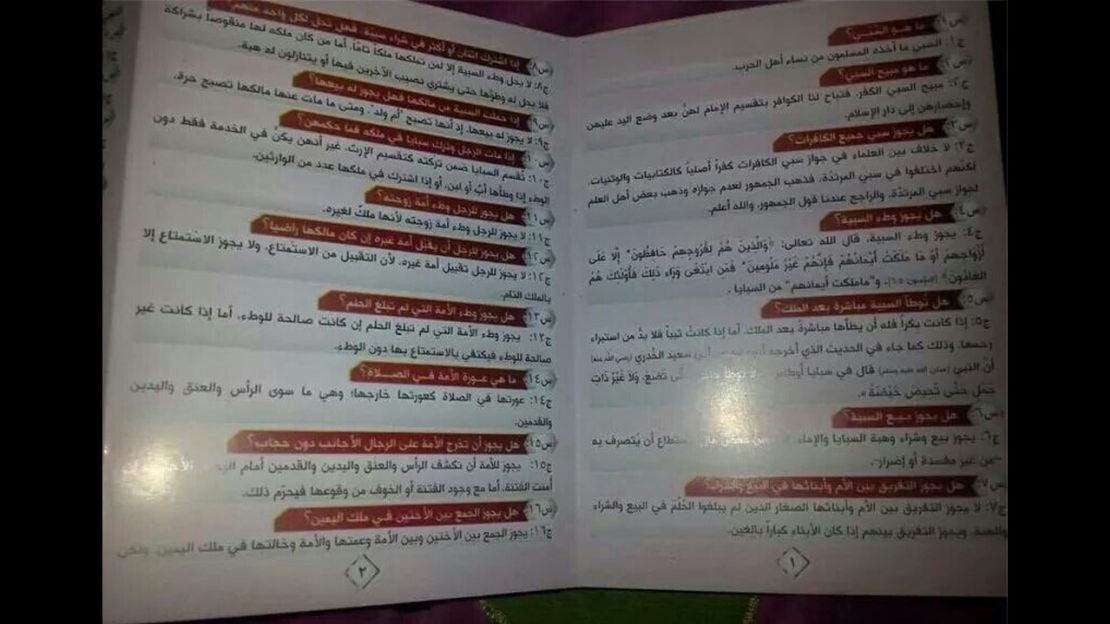Story highlights
ISIS produces a document, "Question and Answers on Female Slaves and their Freedom"
It has been posted online, and armed men distributed it to residents of Mosul
In it, ISIS claims the Quran justifies taking non-Muslim women and girls captive
It also says they can be sold as "property," and that sex with captive girls is permissible
Can you take non-Muslim women and children captive? Yes, says ISIS.
Can you have sex with them, even prepubescent girls? Yes, according to the Islamist extremist group.
Can you sell them or give them as gifts to others? The answer is yes, once again.
People in Mosul – the Iraqi city now under control of the group calling itself the Islamic State – got these and other messages loud and clear after sunset prayers Friday, when armed men handed out a color-printed pamphlet “Question and Answers on Female Slaves and their Freedom,” three residents told CNN.
“People started gathering in small groups chattering about this (document),” said one of the men, whom CNN didn’t name for security reasons. “Most are shocked, but (we) cannot do much about it.”
The document was first printed in October or November, then later posted on an ISIS website. It has gotten more publicity recently because of the Middle East Media Research Institute, an independent Washington-based nonprofit whose advisory board includes former National Security Agency Director Michael V. Hayden, onetime CIA Director James Woolsey and ex-U.S. Defense Secretary Donald Rumsfeld.
The idea that ISIS is kidnapping, selling and raping women and children is hardly surprising. Many such accounts have surfaced since the group began its often brutal run through Syria and Iraq, including chilling stories from members of the Yazidi religious minority. And these are on top of other horrific allegations, such as the killings and mistreatment of innocent civilians simply because they didn’t subscribe to ISIS’ extreme take on Sharia law.
Yazidi women ‘treated like cattle’
And that’s the thing about ISIS: Its militants have justified their actions – like the beheadings of journalists and aid workers – in God’s name.
Even then, it is rare to see its rationale laid out as plainly as in “Question and Answers on Female Slaves and their Freedom.”
In the document, for instance, it is explained that capturing women is permissible if they are “nonbelievers.” It adds, “Female slaves are the women that Muslims took from their enemies.”
Much of the pamphlet talks about ISIS’ policy on having sexual intercourse with a female slave, something that the group cites the Quran to justify.

“If she was a virgin, he (the owner) can have intercourse with her immediately after the ownership is fulfilled,” ISIS explains. “If she was not a virgin, her uterus must be purified (wait for her period to be sure she is not pregnant.)”
There are other rules as well, like that two men who co-own a captive can’t both have sex with her and that a man can’t have intercourse with his wife’s slave.
As to girls: “It is permissible to have intercourse with the female slave who hasn’t reached puberty if she is fit for intercourse,” the document reads. “However, if she is not fit for intercourse, he (the owner ) can only enjoy her without intercourse.”
The Q&A is clear that, young and old, the captors have full control of their captives.
As such, the ISIS document claims, “It is permissible to buy, sell or give as a gift female captives and slaves, for they are merely property.”
In response to the question of whether a female slave can buy her freedom, the answer is, “Yes she can.”
The document also says that freeing a slave is something a sinner who has committed an act like unintentional murder or perjury can do for his sin to be forgiven. Alternative actions are fasting for two consecutive months or feeding hungry people.
The pamphlet sets a few other guidelines, such as that a captive mother can’t be separated from her young children and that an impregnated captive cannot be sold. Beating a female slave for discipline is OK, but beating her for pleasure or as a form of torture is not.
There are fewer rules for the captives themselves, though the ISIS pamphlet does identify one thing as “the gravest of sins” – running away from one’s master.
This document marks the most detailed, albeit not first, justification for enslaving nonbelievers, as defined by ISIS. Time and again, the group cites the Quran and its view of Sharia law.
“ISIS is drawing these rulings from ancient Middle Eastern and Mediterranean codes of conduct for war and prisoners,” said Abbas Barzegar, professor of religious studies at Georgia State University.
“Muslim leaders and lay practitioners the world over continue to condemn ISIS and find its alien interpretation of Islam grotesque and abhorrent. Unfortunately, in the context of failed states and civil wars most sane voices are often the most drowned out.”
None of ISIS’ rationalizations hold up, Seton Hall University law school Professor Bernard Freamon wrote on CNN.com last month.
“This argument is plainly wrong, hypocritical and astonishingly ahistorical, relying on male fantasies inspired by stories from the days of imperial Islam,” said Freamon. “It is also an affront to right-thinking Muslims everywhere and a criminal perversion of Islamic law, particularly its primary source, the glorious Quran.”
CNN’s Hamdi Alkhshali and Yousuf Basil contributed to this report.
![ISIS distributed to the worshipers after the Maghrib [sunset] prayers in Mosul a very large number of the printed colored copy of the pamphlet on the female slaves Q &A. Residents in Mosul told CNN Friday. Armed men known with ISIS showed up in big numbers outside all Mosul's mosques distributing this pamphlet, source adeed. "People starts gathering in small groups chattering about this Fatwa, most are shocked but cannot do much about it" Abu Mazen, a citizen from Mosul told CNN.](https://media.cnn.com/api/v1/images/stellar/prod/141212130618-isis-mosul-list.jpg?q=x_0,y_0,h_720,w_1280,c_fill/w_1280)







